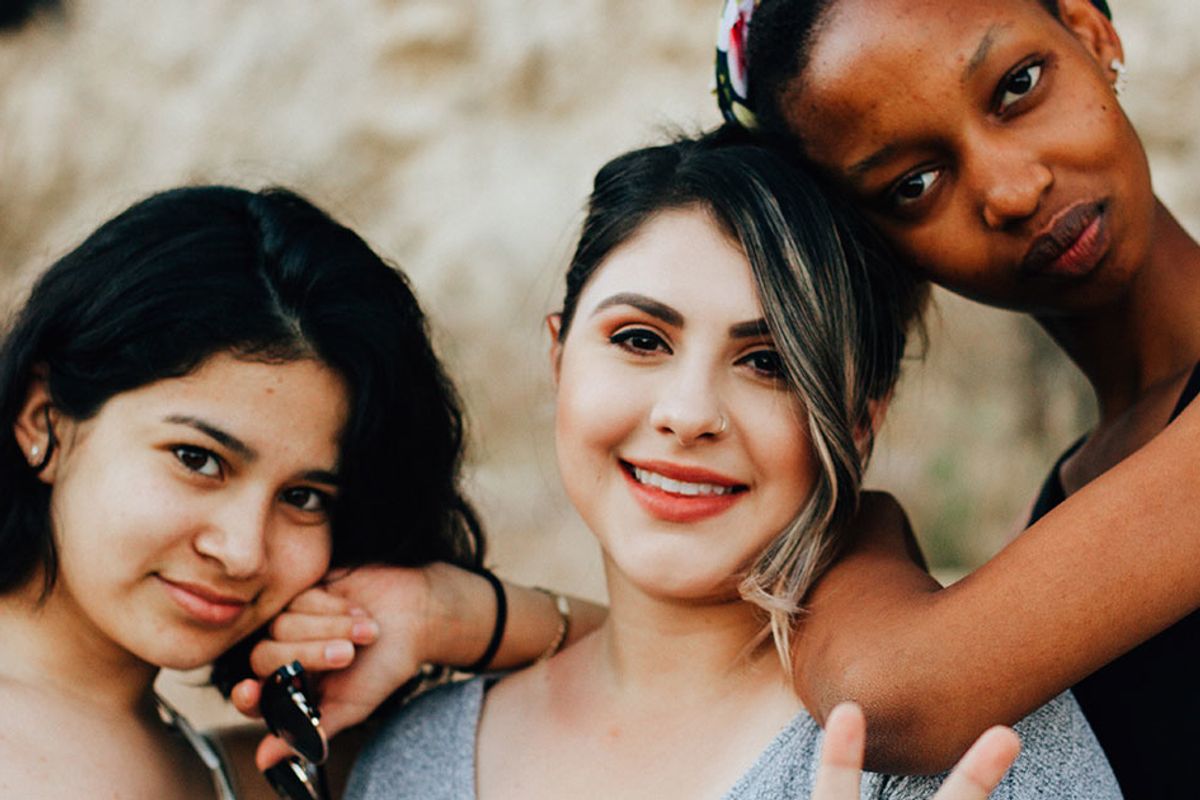Women do better when they have a group of strong female friends, study finds
We're stronger together.

Women do better when they have female friends.
Madeleine Albright once said, "There is a special place in hell for women who don't help other women." It turns out that might actually be a hell on Earth, because women just do better when they have other women to rely on, and there's research that backs it up.
A study published in the Harvard Business Review found that women who have a strong circle of friends are more likely to get executive positions with higher pay. "Women who were in the top quartile of centrality and had a female-dominated inner circle of 1-3 women landed leadership positions that were 2.5 times higher in authority and pay than those of their female peers lacking this combination," Brian Uzzi writes in the Harvard Business Review.
Part of the reason why women with strong women backing them up are more successful is because they can turn to their tribe for advice. Women have to face different challenges than men, such as unconscious bias, and being able to turn to other women who have had similar experiences can help you navigate a difficult situation. It's like having a road map for your goals.
It's interesting to note that women in leadership positions who lacked this style of support system didn't make as much as the women who did. "While women who had networks that most resembled those of successful men (i.e., centrality but no female inner circle) placed into leadership positions that were among the lowest in authority and pay," Uzzi writes. Men and women have different needs, and that even extends to their tribe.
But it's not just in the workplace. A 2006 study found that women who had 10 or more friends were more likely to survive the disease than women who lacked close friends. The study found socially isolated women were 64% more likely to die from cancer, and 43% more likely to have a breast cancer reoccurrence. Friendship is literally the best medicine.
Never underestimate the power of a group text with your girlfriends. Having a place to commiserate over sexism and support other women with goofy gifs when someone succeeds can enrich your life on all fronts.
This article originally appeared on 12.03.19
- 27-year-old who died of cancer left behind final advice that has the ... ›
- Women make better leaders, study finds - Upworthy ›
- A recent study found most men are fine with women running companies but not the government - Upworthy ›
- He asked her to turn down a promotion to spare his ego and the story went viral - Upworthy ›
- Woman's explanation for being 'standoffish to men in public' brings up an important point about unwanted attention - Upworthy ›
- Woman explains how we've devolved to 'catch-up friendships' - Upworthy ›
- 27-year-old offers amazing life advice while dying of cancer - Upworthy ›
- Jennifer Lawrence will make more money than Chris Pratt in their new movie. That's huge. - Upworthy ›
- 5 ridiculous things FIFA spent more money on than prizes for the U.S. women's champions - Upworthy ›
- After a woman asked if they had a 'permit', twin 7-year-olds' lemonade stand is back in business - Upworthy ›






 Leafy harvest: Tobacco leaves hang to dry.
Leafy harvest: Tobacco leaves hang to dry. Children learning the alphabet with teachers.
Children learning the alphabet with teachers. Child upset in colorful classroom.
Child upset in colorful classroom. Little one's big feelings on display.
Little one's big feelings on display. Young patient getting a dental check-up.
Young patient getting a dental check-up. Pregnant woman cradling belly
Pregnant woman cradling belly Solid Snake is here to help your social anxiety!
Solid Snake is here to help your social anxiety!  Queen's "Bohemian Rhapsody" never disappoints.
Queen's "Bohemian Rhapsody" never disappoints.  Border collie clapping
Border collie clapping  James Spader in Pretty in Pink.
James Spader in Pretty in Pink.  Duckie gets chosen in Pretty in Pink.
Duckie gets chosen in Pretty in Pink.  Molly Ringwald in her Pretty in Pink prom dress.
Molly Ringwald in her Pretty in Pink prom dress.